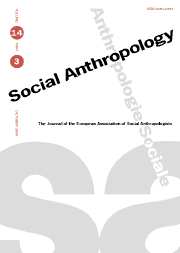Crossref Citations
This article has been cited by the following publications. This list is generated based on data provided by
Crossref.
Schiemann, John W.
2007.
Bizarre Beliefs and Rational Choices: A Behavioral Approach to Analytic Narratives.
The Journal of Politics,
Vol. 69,
Issue. 2,
p.
511.
Stott, Graham St. John
2007.
Missouri Zion, MissouriIntifada: Mormonism, Zionism and the Palestine Conflict.
Holy Land Studies,
Vol. 6,
Issue. 1,
p.
7.
Neofotistos, Vasiliki P.
2008.
“The Balkans’ Other within”: Imaginings of the West in the Republic of Macedonia.
History and Anthropology,
Vol. 19,
Issue. 1,
p.
17.
Litvak, Meir
2009.
Palestinian Collective Memory and National Identity.
p.
1.
Muzondidya, James
2010.
The Zimbabwean Crisis and the Unresolved Conundrum of Race in the Post-colonial Period.
Journal of Developing Societies,
Vol. 26,
Issue. 1,
p.
5.
Ventura, Jonathan
2011.
Under the Flag of Blue and White: Mary as an A-NationalSymbol in the Greek-Orthodox Community in Israel.
Sociology Mind,
Vol. 01,
Issue. 04,
p.
230.
Rizk, Philip
2011.
Fatah: Mythific Ation of A Non-state: Critique of the Idea of State.
Human Geography,
Vol. 4,
Issue. 1,
p.
57.
Armakolas, Ioannis
2011.
The ‘Paradox’ of Tuzla City: Explaining Non-nationalist Local Politics during the Bosnian War.
Europe-Asia Studies,
Vol. 63,
Issue. 2,
p.
229.
Collins-Kreiner, Noga
Shmueli, Deborah F.
and
Ben Gal, Michal
2013.
Spatial transgression of new religious sites in Israel.
Applied Geography,
Vol. 40,
Issue. ,
p.
103.
BOVENSIEPEN, JUDITH
2014.
Installing the insider “outside”: House reconstruction and the transformation of binary ideologies in independent Timor-Leste.
American Ethnologist,
Vol. 41,
Issue. 2,
p.
290.
Bowman, Glenn
2014.
Violence before Identity: An Analysis of Identity Politics.
The Sociological Review,
Vol. 62,
Issue. 2_suppl,
p.
152.
Brković, Čarna
2016.
Scaling Humanitarianism: Humanitarian Actions in a Bosnian Town.
Ethnos,
Vol. 81,
Issue. 1,
p.
99.
Sofos, Spyros
2017.
In the Aftermath of Gezi.
p.
65.
Tsagarousianou, Roza
2017.
Contested Memories and the Demands of the Past.
p.
127.
Christou, Fanny
and
Sofos, Spyros
2019.
The Handbook of Diasporas, Media, and Culture.
p.
529.
Tsagarousianou, Roza
2019.
The Handbook of Diasporas, Media, and Culture.
p.
77.
JAIN, Vanshaj Ravi
2020.
Broken Boundaries: Border and Identity Formation in Post-Colonial Punjab.
Asian Journal of International Law,
Vol. 10,
Issue. 2,
p.
261.
David, Lea
2020.
The Past Can't Heal Us.
Bowman, Glenn
2021.
Strategies of dealing with the other.
HAU: Journal of Ethnographic Theory,
Vol. 11,
Issue. 1,
p.
85.
GÜVEN, İbrahim Fevzi
and
DURAN, Hasan
2022.
Radovan Karadziç’in Bosna Savaşı’na Dair Güvenlikleştirme Siyasetinde Kullandığı Söylemler.
Marmara Üniversitesi Siyasal Bilimler Dergisi,
Vol. 10,
Issue. 1,
p.
192.




